|

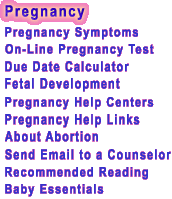
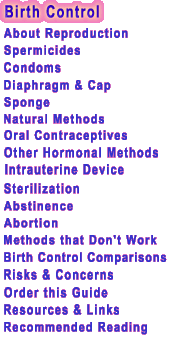
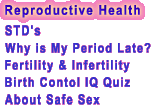



#1 for Pregnant Moms

Order Prenatal Vitamins

|
|
Changes in Pregnancy
![[Pregnant Woman]](graphics/pregclock.jpg)
Pregnancy is a natural process involving big
changes in a woman's body.
Most women have uncomplicated pregnancies and their daily routines may not change
until the last few weeks before delivery.
Other women have difficult pregnancies that change their
daily lives right from the start.
Most women experience emotional shifts and mood
swings. It's natural to feel doubt, anxiety, and fear
about pregnancy and childbirth, as well as
happiness, excitement, and anticipation.
As soon as you think you might be pregnant, you should visit a
pregnancy help center or clinic right away for a pregnancy test.
If you are pregnant it is important to learn more about what to
expect from pregnancy and how to care for yourself and your
growing baby. If you smoke or drink, you should stop
immediately -- tobacco and alcohol can harm your unborn child.
Pregnancy typically lasts 40 weeks, or 9 months. That
time is divided into three periods called trimesters
(three-month intervals), during which different things happen
to your body and to the baby. Below is a list of some of
the normal things a pregnant woman may experience during
each trimester. If you are pregnant you may or may not
experience the changes described here. They may
happen earlier or later than they appear on this list, and
some may continue throughout the pregnancy.
 DID YOU KNOW... Pregnancy is counted from the first day of a woman's last period.
This means that at conception, the unborn child is already considered two weeks old!
DID YOU KNOW... Pregnancy is counted from the first day of a woman's last period.
This means that at conception, the unborn child is already considered two weeks old!
|
|
|
The First Trimester
(Week 1 - Week 12)
- Your period stops or becomes very light.
- You may feel nausea or queasiness. Some women
vomit. ("Morning sickness" can happen any time of day --
it may help to eat small meals throughout the
day, snack on crackers or toast, or drink juice
or lemonade.)
- Your breasts swell and may be tender.
- Your nipples and the area around the nipples
(areola) get darker and broader.
- You have to urinate more often.
- You feel tired.
- You may become constipated and have
heartburn (Tums may help).
- You may have headaches.
- You experience mood swings -- feel angry,
sad, or happy for no reason.
|
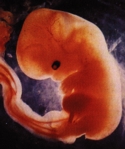
Six Weeks: By twenty-one days after fertilization, the embryo's tiny heart has begun beating.
More about the First Trimester
|
 WARNING Although most pregnancies are uncomplicated, dangerous situations can develop.
If you experience a sharp pain on the side in early pregnancy, or bleeding and/or cramping at anytime during pregnancy,
call your doctor immediately!
WARNING Although most pregnancies are uncomplicated, dangerous situations can develop.
If you experience a sharp pain on the side in early pregnancy, or bleeding and/or cramping at anytime during pregnancy,
call your doctor immediately!
|
|
|
The Second Trimester
(Week 13 - Week 26)
- You gain weight.
- You can feel the fetus moving.
- The skin on your stomach stretches and may get dry.
(Use lotion to lessen
the chance of stretch marks.)
- Your breasts get bigger.
It helps to wear a supportive bra.
- A small amount of thin
fluid (called colostrum)
may come out of your nipples.
- You may experience ongoing heartburn,
indigestion, and constipation.
- You may get nosebleeds.
- Your feet, hands, ankles and face may swell (this
is called edema).
- A dark line develops on your skin between your
navel and your pubic area.
- A "mask" or darker area or pigmentation may
develop on your face. (It disappears after the
pregnancy ends.)
|

Eighteen Weeks: By this time
eyebrows, eyelashes, and fine hair appear. The child can grasp with his hands, kick, or even somersault.
More about the Second Trimester
|
|
The Third Trimester
(Week 27 - 40)
- You can see the fetus move from the outside.
- Your navel pushes out.
- You begin to get backaches.
- You begin to walk differently to accommodate the weight of the fetus.
- You experience painless "practice" contractions.
- You have shortness of breath.
- Finally, labor and delivery!
|
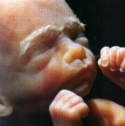
Twenty-four Weeks:
Seen here at six months, the unborn child is covered with a
fine, downy hair called lanugo and a waxy
substance called vernix. The fetus still has much growing to do, but
some babies could survive if born this early.
More about the Third Trimester
|
|
For More Information
For more information about pregnancy, visit your nearest pregnancy help center.
Tell your clinician
about your symptoms, and be
sure to call immediately if
you have unusual bleeding,
feel pain, or have any other
symptoms that worry you. If
you need a referral, click here
and fill out the form for
a center near you.
|
Sources:
- "How a Woman's Body Changes During Pregnancy,"
Teen Wire, Planned Parenthood Federation of America, 2001
- A Child Is Born by Lennart Nilsson (also in paperback),October 1990.
- "Fetal Development," Westside Pregnancy Resouce Center, 2001.
|
|

![[rose]](graphics/rose-med.gif)










![[Pregnant Woman]](graphics/pregclock.jpg)